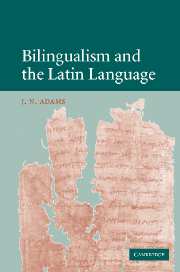Book contents
- Frontmatter
- Contents
- Preface
- Acknowledgments
- List of abbreviations
- 1 INTRODUCTION
- 2 LANGUAGES IN CONTACT WITH LATIN
- 3 CODE-SWITCHING
- 4 BILINGUALISM, LINGUISTIC DIVERSITY AND LANGUAGE CHANGE
- 5 LATIN IN EGYPT
- 6 BILINGUALISM AT DELOS
- 7 BILINGUALISM AT LA GRAUFESENQUE
- 8 THE LATIN OF A LEARNER (P. AMH. II.26): A CASE STUDY
- 9 SOME CONCLUDING REMARKS
- Bibliography
- Indexes
4 - BILINGUALISM, LINGUISTIC DIVERSITY AND LANGUAGE CHANGE
Published online by Cambridge University Press: 03 December 2009
- Frontmatter
- Contents
- Preface
- Acknowledgments
- List of abbreviations
- 1 INTRODUCTION
- 2 LANGUAGES IN CONTACT WITH LATIN
- 3 CODE-SWITCHING
- 4 BILINGUALISM, LINGUISTIC DIVERSITY AND LANGUAGE CHANGE
- 5 LATIN IN EGYPT
- 6 BILINGUALISM AT DELOS
- 7 BILINGUALISM AT LA GRAUFESENQUE
- 8 THE LATIN OF A LEARNER (P. AMH. II.26): A CASE STUDY
- 9 SOME CONCLUDING REMARKS
- Bibliography
- Indexes
Summary
INTRODUCTION
Works on historical linguistics have tended to concentrate on factors internal to a language as determining linguistic change, but external factors may also be influential, though perhaps mainly in the short term (see below, VI.4). This chapter will be about language contact as a cause of language change, in either or both of the languages in contact. I make the assumption that most bilinguals will have a first or ‘native’ language and a second language. There are ‘balanced’ bilinguals, but these are probably in a minority except in some special communities. In the material available from antiquity it is usually possible to identify a writer's first language.
The chapter has several aims. First, in general accounts of bilingualism and language change evidence from antiquity has been neglected, though it is extensive. Thomason and Kaufman (1988), for example, range all over the world but pass over antiquity in silence. This chapter will present evidence relevant to the general debate. Secondly, discussions of cross-language influence in the Roman world (such as that of R. Coleman (1975)) have dealt above all with the literary languages, and non-literary evidence has not been fully exploited. The present chapter will not be restricted to the non-literary evidence, but that will occupy a significant place. Thirdly, in keeping with a general theme of the book I will be attempting to identify the effects of bilingualism on the regional diversification of Latin.
- Type
- Chapter
- Information
- Bilingualism and the Latin Language , pp. 417 - 526Publisher: Cambridge University PressPrint publication year: 2003



